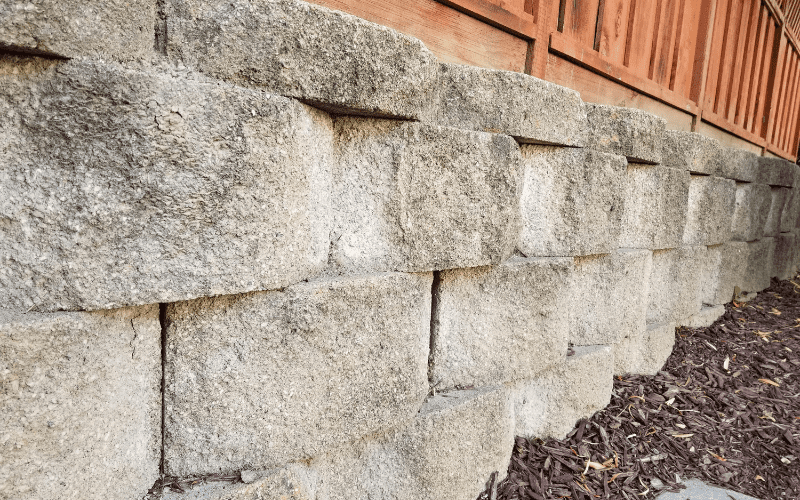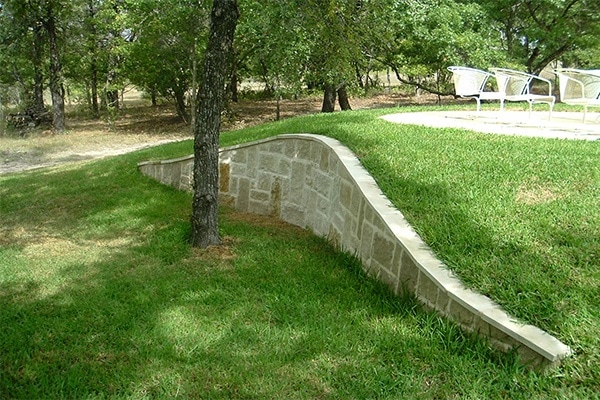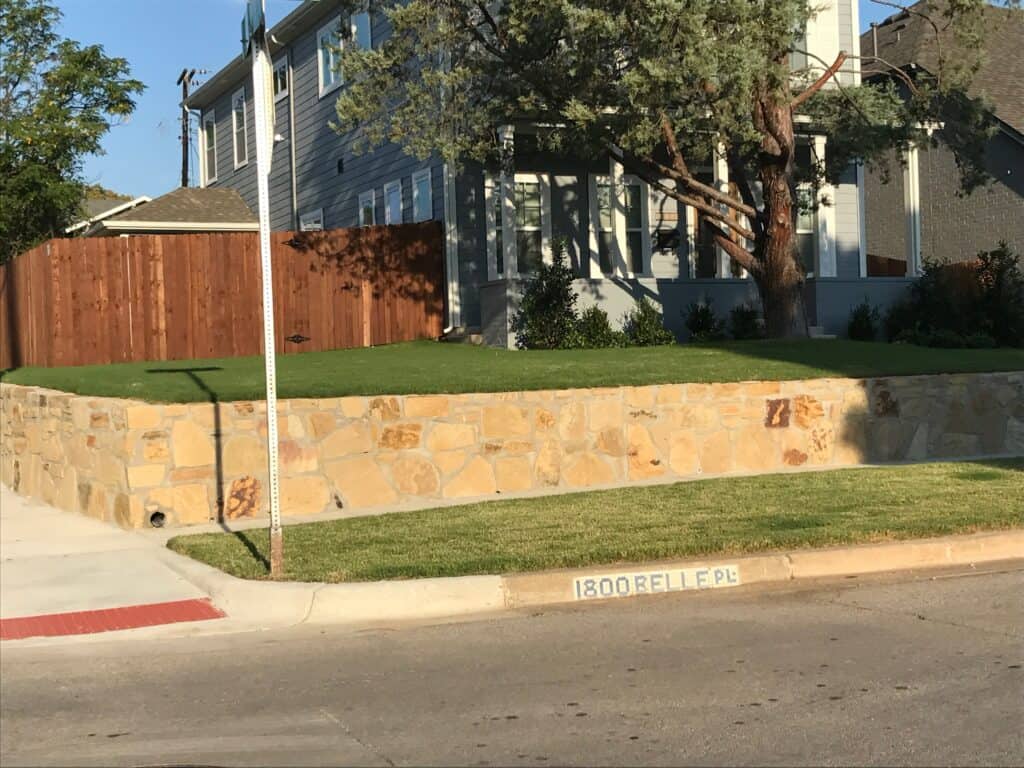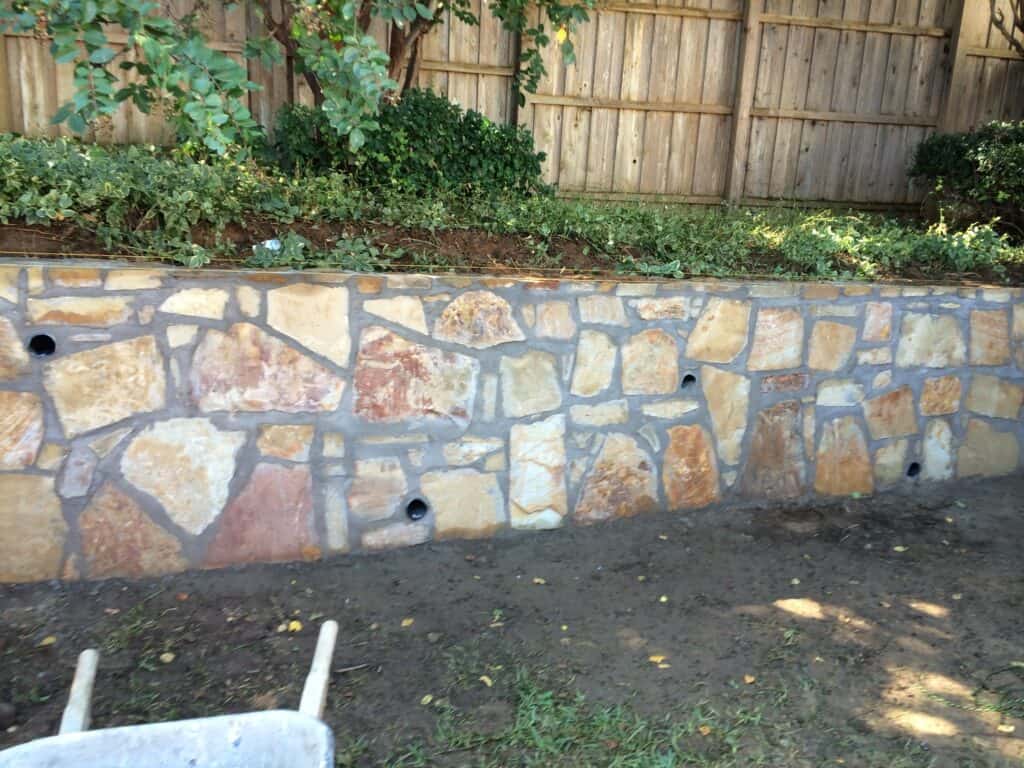If you’re a property owner looking to add structure and functionality to your landscaping, a retaining wall may be just what you need. Retaining walls offer erosion control, space maximization, aesthetic improvement, and increased property value. In this article, we’ll explore what a retaining wall is, the different types available, the benefits, and proper maintenance. We’ll also discuss why you should choose Circle D Construction for your retaining wall needs.
What is a Retaining Wall?
Retaining walls prevent soil erosion and keep the area behind from collapsing. These walls are popular on sloped properties where gravity can cause soil movement, commonly preventing erosion.
They can be made from various materials, including concrete, stone, brick, and wood. The choice of materials depends on the property owner’s desired function, aesthetic preferences, and budget. Concrete walls last long, while stone walls can give a natural and rustic feel to landscaping.
They offer both functionality and aesthetics to outdoor spaces, enhancing the property’s overall appeal. By choosing materials and designs that complement the style of the home, a retaining wall can enhance the property’s overall aesthetic appeal.
This type of hardscape can provide erosion control, increase usable space, and improve outdoor appearance for property owners.
Types of Retaining Walls
There are several types of retaining walls, each with unique advantages and disadvantages. The best suited for a particular property depends on several factors, including the slope of the terrain, the type of soil, the available space, and the budget.
Gravity Retaining Walls
This retaining wall relies on its weight and mass to resist the pressure of soil and other materials. Gravity retaining walls use heavy materials, like concrete or stone, and designers typically construct them for smaller wall heights.
Cantilevered Retaining Walls
Contractors make cantilevered retaining walls from reinforced concrete and design them to resist soil pressure by balancing weight and tension. These walls are constructed with base, stem, and horizontal slabs, often used in medium-sized wall heights.
Sheet Pile Retaining Walls
Interlocking steel, wood, or vinyl sheets are used to create this type of wall by driving them into the ground to resist soil pressure. Sheet pile retaining walls are commonly used when space is limited, and the soil is soft or loose.
Anchored Retaining Walls
Anchored retaining walls are similar to cantilevered retaining walls but use cables or rods anchored into the soil to provide additional support. These walls are typically used in taller wall heights or where the soil is loose or unstable.
Gabion Retaining Walls
Gabion retaining walls are made from wire mesh baskets filled with rocks, concrete, or other materials. Homeowners commonly use these walls in areas where aesthetics are not a primary concern, such as along highways or in industrial areas.
Each wall has unique advantages and disadvantages, and choosing the right type for a particular property requires careful consideration of its needs and limitations. An experienced and knowledgeable contractor, such as Circle D Construction, can help property owners make the best decision for their space.
Benefits of a Retaining Wall
Retaining walls offer a variety of benefits to property owners, including:
Erosion Control
One of the primary benefits of a retaining wall is their ability to prevent soil erosion. By holding soil and other materials in place, they help to stabilize slopes and hillsides, preventing landslides and other erosion-related problems.
Increased Usable Space
Retaining walls can level out sloping or uneven terrain, creating more usable space for outdoor activities, gardening, or other purposes. This increased space can be precious in urban or suburban areas with limited outdoor space.
Improved Aesthetics
Homeowners can create retaining walls to complement the style and aesthetic of their property, adding visual interest and enhancing its overall appearance. Different materials, textures, and colors can create a unique and attractive outdoor space.
Property Value
A well-designed and professionally installed structure can increase the value of a property. They can also increase the property’s attractiveness to potential buyers, which can be beneficial if you plan to sell the property in the future.
Safety
Retaining walls can improve the safety of a property by preventing soil erosion and protecting against landslides. This can be especially important in areas prone to natural disasters or extreme weather events.
Low Maintenance
Once installed, retaining walls require minimal maintenance. Regular inspections and minor repairs may be necessary, but a low-maintenance landscaping option.
Overall, these structures offer property owners various benefits, from erosion control and increased usable space to improved aesthetics and property value. By working with an experienced and reputable contractor, property owners can enjoy these benefits for many years.
Maintenance
While retaining walls are generally low-maintenance landscaping features, routine maintenance is necessary to keep them in good condition and ensure longevity. Here are some maintenance tips:
Inspect Regularly
You should conduct inspections after significant weather events, such as heavy rain or snow, to ensure the wall is not compromised.
Clean Debris
Retaining walls can accumulate debris such as leaves, dirt, and other organic matter over time, which can cause deterioration. Regular cleaning of the wall will prevent the buildup of debris that can trap moisture and cause damage.
Repair Damage
You should repair any signs of damage as soon as possible. You can repair small cracks and chips with patching compound or sealant, while more significant damage may require professional repairs.
Proper Drainage
Proper drainage is essential to ensure that water does not collect behind the wall, which can cause damage to its foundation. Installing proper drainage systems, such as French drains or weep holes, can help prevent water buildup.
By following these maintenance tips, property owners can ensure that their structure remain in good condition and continue to provide the many benefits they offer for years. Working with a professional contractor, such as Circle D Construction, is also essential for regular inspections and maintenance services to ensure the structure’s longevity.
Why Choose Circle D Construction
At Circle D Construction, we specialize in designing and building retaining walls that are both functional and beautiful. Our experienced professionals will work with you to create a custom structure that meets your needs and preferences.
We understand every property is unique, so we offer customizable solutions to meet our client’s needs. Whether you need to prevent erosion, create a level area for landscaping, or add visual interest to your outdoor space, we have the expertise to get the job done.
Conclusion
In conclusion, retaining walls are essential for any property with sloped or uneven terrain. They serve as a functional solution for preventing erosion, creating level areas for landscaping, and enhancing the aesthetic value of outdoor spaces.
Choose Circle D Construction for all your retaining wall needs. Experience the benefits of working with a reputable and experienced contractor committed to delivering high-quality, customizable solutions and exceptional customer service. Contact us today for an estimate!




